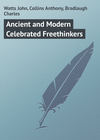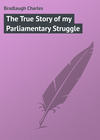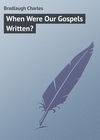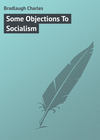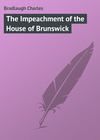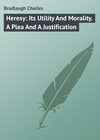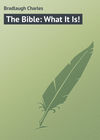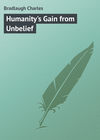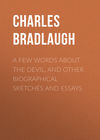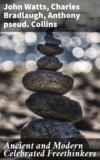Buch lesen: «Ancient and Modern Celebrated Freethinkers», Seite 13
FRANCES W. D'ARUSMONT
The previous issues of this publication contain notices of the lives and writings of men of eminence in the world of Freethought. This number is devoted to a review of the career and works of a most talented and accomplished lady – a Freethinker and Republican. As a proof – if any proof were needed – that women, if adequately educated, are equally capable with men to become teachers and reformers, the works of the subject of present notice afford abundant evidence. The efforts now being made to procure an adjustment of the laws relating to women, whereby they will be protected in their property, and consequently improved in their social position, deserve the support of all classes; When females become independent, there will be less ignorance among women and more happiness among men.
Frances Wright, afterwards Madame D'Arusmont, was a native of Dundee. She was born on the 6th of September, 1795. She came of a wealthy family, who had been extensive holders of city property from the year 1500. Her father was a man of considerable literary attainments, and to his active antiquarian researches and donations the British Museum is indebted for many rare and valuable coins and medals. He died young, as also his wife, leaving three children – two girls and a boy. Frances was then but two years and a half old. At the wish of her grandfather, General Duncan Campbell, she was taken to England, and reared as a ward of Chancery, under the guardianship of a maternal aunt. She grew to be very tall in person, erect, and of a commanding figure; large eyes, and magnificent head, with a face somewhat masculine, but well formed, and decidedly handsome. Her brother was sent to India, at the age of fifteen, as a cadet in the East India Company's service, and was killed on the passage out in an encounter with a French vessel. Her sister passed her life with her, and died in Paris in 1831.
At an early age, Miss Wright gave evidence of great intellectual ability. The education she received was of a very superior kind. She diligently applied herself to the various branches of science, and to the study of ancient and modern letters and the arts, being impelled by a strong desire for knowledge. At the age of nineteen, she published her first work, "A Few Days in Athens." Her attention was early drawn to the sufferings of the lower classes, and on reflection she became convinced that some great vice lay at the foundation of the whole of human practice: She determined to endeavor to discover, and assist in removing it. She read Bocca's "History of the American Revolution," and resolved to visit that country, it appearing to her young imagination as the land of freedom and hope. – After having familiarised herself with the government and institutions of America, she sailed for New York 1818. She returned to England in 1820, and published a large volume, entitled "Views of Society and Manners in America." It was dedicated to Jeremy Bentham, and had a large sale. The work being translated into most of the continental languages, she became known to the prominent reformers of Europe.
In 1821, she made her first visit to Paris, and was there introduced to General Lafayette, who, having previously read her work on America, invited her to that city. A republican in all her views and hopes, she was highly appreciated by Lafayette and other eminent supporters of the liberal party in France. – She remained in Paris until 1824, when she returned to the United States, and immediately undertook a project for the abolition of slavery upon a plan somewhat different from any that then engaged the attention of philanthropists. For this purpose she purchased two thousand acres of land at Chickasaw Bluffe, (now Memphis, Tennessee), intending to make a good farm rather than a cotton plantation. She then purchased several slave families, gave them their liberty, and removed them to the farm, residing there herself to direct their labor. Commencing this novel undertaking with all that enthusiasm for which she was remarkable, she continued the experiment some three years and a half, when her health gave way, and, suffering under severe sickness, she made a voyage to Europe for her recovery. During her absence, the farm got involved in difficulties by the influence of her enemies; and finally, the whole project falling through, the negroes were sent off to Hayti at her expense. – She gave much time and money to the carrying forward of this experiment; and though it was a failure, it strikingly exhibited her strong sympathy and benevolence for an oppressed and degraded class of beings. Returning from Europe, she went to New Harmony (Indiana) to assume the proprietorship of a periodical the Harmony Gazette, which had been published under the direction of Robert Dale Owen. In 1828, leaving Mr. Owen in charge of the paper, she began a lecturing tour through the Union; and probably no man, and certainly no woman, ever met with such furious opposition. Her views, as announced in her paper, had made her generally known, and, being somewhat new and radically "anti-theological," brought down upon her head the rancor of religious bigotry. As no church or hall would be opened for her, she lectured in theatres; and her ability and eloquence drew great audiences. On one occasion, while preparing to lecture in a theatre at Baltimore, she was threatened with the destruction of her life if she attempted to speak. She calmly replied, that she thought she knew the American people, and for every riotous fanatic that might annoy her, a hundred good citizens would protect her, and she was not afraid to place herself in their hands. She judged rightly. She went to the theatre, which was crammed from pit to ceiling, and lectured to an admiring and enthusiastic audience. In other cities she was not always so fortunate; more or less rioting occurred, while the press, almost without exception, denounced her in the bitterest terms. Subsequently, her paper was removed to New York. Some years afterwards, she again made a lecturing tour, but this time she spoke on subjects of a political nature, and met with a better reception. In addition to lecturing, she conducted a political magazine, entitled the Manual of American Principles, and was also engaged with Mr. Kneeland in editing the Boston Investigator. She wrote a great deal, and upon many subjects. Among her many works is a tragedy called "Altorf," which was performed on the stage, the principal character being sustained by Mr. James Wallack. Her last work, of any considerable size, was entitled "England the Civiliser," published in London in 1847.
Madame D'Arusmont died suddenly in Cincinnati, on Tuesday, December 14, 1852, aged fifty-seven. She had been for sometime unwell, in consequence of a fall upon the ice the previous winter, which broke her thigh, and probably hastened her decease; but the immediate cause of her death was the rupture of a blood vessel. She was aware of her situation, knew when she was dying, and met her last hour with perfect composure. A daughter, her only child, survives her.
In a small work entitled "Observations on Religion and Civilization," are given the following "Definitions of Theology and Religion: in the words and in the things signified. Origin and Nature of Theology: " —
"Theology from the Greek theos, logos, renders distinct the meaning of the subject it attempts to treat. —Theos, God, or Gods, unseen beings and unknown causes. Logos, word, talk – or, if we like to employ yet more familiar and expressive terms, prattle or chatter. Talk, or prattle, about unseen beings or unknown causes, The idleness of the subject, and inutility – nay, absolute insanity of the occupation, sufficiently appears in the strict etymological meaning of the word employed to typify them. The danger, the mischief, the cruelly immoral, and, if I may be permitted to coin a word for the occasion, the unhumanizing tendencies both of the subject and the occupation, when and where these are (as they have for the most part ever been throughout the civilized world) absolutely protected by law and upheld by government, sufficiently appear also from the whole page of history. Religion, from the Latin religio, religio, renders with equal distinctness the things signified. Religo, to tie over again, to bind fast; religio, a binding together, a bond of union. The importance of the great reality, here so accurately shadowed out, appears sufficiently in the etymological signification of the word. Its utility will be evident if we read, with intelligence, the nature, the past history, the actual condition, and the future destiny of man. But now, taking these two things in the most strict etymological sense of the words which express them, it will readily be distinguished that the first is a necessary creation of the human intellect in a certain stage of inquiry; the second, a necessary creation of the human soul (by which I understand both our intellectual and moral faculties taken conjointly) in any and every state of human civilization. Theology argues, in its origin, the first awakening of human attention to the phenomena of nature, and the first crude efforts of human ingenuity to expound them. While man sees the sun and stars without observing either their diurnal or their annual revolutions; while he receives upon his frame the rain and the wind, and the varying elements, without observing either their effects upon himself or upon the field of nature around him, he is as the brute which suffers and enjoys without inquiring why it experiences light or darkness, pain or pleasure. When first he puts, in awkward language, to himself or to his fellow, the question why does such an effect follow such a cause? he commences his existence, if not as a reasonable being, (a state at which he has not yet arrived) at least as a being capable of reason. The answer to this first inquiry of awakening intelligence is, of course, such as his own circumscribed observation supplies. – It is, in fine, in accordance with the explanation of the old nurse to the child, who, asking, when startled by a rolling peal of thunder – 'what makes that noise' was fully satisfied by the reply: 'my darling, it is God Almighty overhead moving his furniture.' Man awakening to thought, but still unfamiliar with the concatenation of natural phenomena, inevitably conceives of some huge being, or beings, bestriding the clouds and whirlwind, or wheeling the sun and the moon like chariots through the blue vault. And so again, fancy most naturally peoples the gloom of the night with demons, the woods and the waters with naiads and dryads, elves and fairies, the church-yard with ghosts, and the dark cave and the solitary cot with wizards, imps and old witches. Such, then, is theology in its origin; and, in all its stages, we find it varying in grossness according to the degree of ignorance of the human mind; and, refining into verbal subtleties and misty metaphysics in proportion as that mind exchanges, in its progress from darkness to light, the gloom of ignorance for the mass of terror."
The nature of belief in the unknowable, and the dire consequences arising from fanaticism, are ably depicted in the following passages, selected from Lecture IV., on "Religion: " —
"Admitting religion to be the most important of all subjects, its truths must be the most apparent; for we shall readily concede, both that a thing true, must be always of more or less importance – and that a thing essentially important, must always be indisputably true. Now, again, I conceive we shall be disposed to admit, that exactly in proportion to the indisputability of a truth, is the proof it is capable of affording; and that, exactly in proportion to the proof afforded, is our admission of such truth and belief in it. If, then, religion be the most important subject of human inquiry, it must be that also which presents the most forcible, irrefragable, and indisputable truths to the inquirer. – It must be that on which the human mind can err the least, and where all minds must be the most agreed. If religion be at once a science, and the most true of all sciences, its truths must be as indisputable as those in any branch of the mathematics – as apparent to all the senses as those revealed by the chemist or observed by the naturalist, and as easily referred to the test of our approving or disapproving sensations, as those involved in the science of morals… Is religion a science? Is it a branch of knowledge? Where are the things known upon which it rests? Where are the accumulated facts of which it is compounded? What are the human sensations to which it appeals? Knowledge is compounded of things known. It is an accumulation of facts gleaned by our senses, within the range of material existence, which is subject to their investigation… Now let us see where, in the table of knowledge, we may class religion. Of what part or division of nature, or material existence, does it treat? What bodies, or what properties of tangible bodies, does it place in contact with our senses, and bring home to the perception of our faculties? It clearly appertains not to the table of human knowledge, for it treats not of objects discoverable within the field of human observation. 'No,' will you say? 'but its knowledge is superhuman, unearthly – its field is in heaven.' My friends, the knowledge which is not human, is of slippery foundation to us human creatures. Things known, constitute knowledge; and here is a science treating of things unseen, unfelt, uncomprehended! Such cannot be knowledge. What, then, is it? Probability? possibility? theory? hypothesis? tradition? written? spoken? by whom? when? where? Let its teachers – nay, let all earth reply! But what confusion of tongues and voices now strike on the ear! From either Indies, from torrid Africa, from the frozen regions of either pole, from the vast plains of ancient Asia, from the fields and cities of European industry, from the palaces of European luxury, from the soft chambers of priestly ease, from the domes of hierarchal dominion, from the deep cell of the self-immolated monk, from the stony cave of the self-denying anchorite, from the cloud-capt towers, spires, and minarets of the crescent and the cross, arise shouts, and hosannas, and anathemas, in the commingled names of Brama, and Veeshnu, and Creeshna, and Juggernaut; heavenly kings, heavenly queens, triune deities, earth-born gods, heaven-born prophets, apotheosized monarchs, demon-enlightened philosophers, saints, angels, devils, ghosts, apparitions, and sorceries! But, worse than these sounds which but stun the ear and confound the intellect, what sights, oh! human kind! appal the heart! The rivers of earth run blood! Nation set against nation! Brother against brother! Man against the companion of his bosom! and that soft companion, maddened with the frenzy of insane remorse for imaginary crimes? fired with the rage of infatuated bigotry, or subdued to diseased helplessness and mental fatuity, renounces kindred, flies from social converse, and pines away a useless or mischievous existence in sighings and tremblings, spectral fears, uncharitable feelings and bitter denunciations! Such are thy doings, oh! religion! Or, rather, such are thy doings, oh! man! While standing in a world so rich in sources of enjoyment, so stored with objects of real inquiry and attainable knowledge, yet shutting thine eyes, and, worse, thine heart, to the tangible things and sentient creatures around thee, and winging thy diseased imagination beyond the light of the sun which gladdens thy world, and contemplation of the objects which are here to expand thy mind and quicken the pulses of thy heart!.. I will pray ye to observe how much of our positive misery originates in our idle speculations in matters of faith, and in our blind, our fearful forgetfulness of facts – our cold, heartless, and, I will say, insane indifference to visible causes of tangible evil, and visible sources of tangible happiness. Look to the walks of life, I beseech ye – look into the public prints – look into your sectarian churches – look into the bosoms of families – look into your own bosoms, and those of your fellow beings, and see how many of our disputes and dissensions, public and private – how many of our unjust actions – how many of our harsh judgments – how many of our uncharitable feelings – spring out of our ignorant ambition to rend the veil which wraps from our human senses the knowledge of things unseen, and from our human faculties the conception of causes unknown? And oh! my fellow beings! do not these very words unseen and unknown, warn the enthusiast against the profanity of such inquiries, and proclaim to the philosopher their futility? Do they not teach us that religion is no subject for instruction, and no subject for discussion? Will they not convince us that as beyond the horizon of our observation we can know nothing, so within that horizon's the only safe ground for us to meet in public?.. Every day we see sects splitting, creeds new modelling, and men forsaking old opinions only to quarrel about their opposites.
"I see three Gods in one, says the Trinitarian, and excommunicates the Socinian, who sees a God-head in unity. I see a heaven but no hell, says the Universalist, and disowns fellowship with such as may distinguish less. 'I see a heaven and hell also, beyond the stars,' said lately the Orthodox friend, and expelled his shorter-sighted brethren from the sanctuary. I seek them both in the heart of man, said the more spiritual follower of Penn, and straightway builded him up another temple, in which to quarrel with his neighbor, who perhaps only employs other words to express the same ideas. For myself, pretending to no insight into these mysteries, possessing no means of intercourse with the inhabitants of other worlds, confessing my absolute incapacity to see either as far back as a first cause, or as far forward as a last one, I am content to state to you, my fellow creatures, that all my studies, reading, reflection, and observation, have obtained for me no knowledge beyond the sphere of our planet, our earthly interests and our earthly duties; and that I more than doubt whether, should you expend all your time and all your treasure in the search, you will be able to acquire any better information respecting unseen worlds and future events than myself."
The philosophical romance, "A Few Days in Athens," though the first of Miss Wright's works, and written when she was very young, displays considerable power and eloquence. It is the most pleasing of all her writings. It is intended to portray the doctrines of Epicurus, and gives a picture of the Gargettian, in the "Gardens of the Academy," surrounded by his pupils, calculated to counteract many of the popular and erroneous notions entertained of that philosopher's teachings. The following dialogue between Epicurus and his favorite, Theon, will afford the readers of the "Half-Hours" an opportunity of judging how far Miss Wright has conveyed a truthful idea of Epicurus's ethical philosophy: —
"On leaving you, last night," said Theon, "I encountered Cleanthes. He came from the perusal of your writings, and brought charges against them which I was unprepared to answer."
"Let us hear them, my son; perhaps, until you shall have perused them yourself, we may assist your difficulty."
"First, that they deny the existence of the Gods."
"I see but one other assertion that could equal that in folly," said Epicurus.
"I knew it," exclaimed Theon, triumphantly, "I knew it was impossible. But where will not prejudice lead men, when even the uptight Cleanthes is capable of slander?"
"He is utterly incapable of it," said the Master; "and the inaccuracy, in this case, I rather suspect to rest with you than with him. To deny the existence of the Gods would indeed be presumption in a 'philosopher; a presumption equalled only by that of him who should assert their existence."
"How!" exclaimed the youth, with a countenance in which astonishment seemed to suspend every other expression.
"As I never saw the Gods, my son," calmly continued the Sage, "I cannot assert their existence; and that I never saw them, is no reason for my denying it."
"But do we believe nothing except that of which we have ocular demonstration?"
"Nothing, at least, for which we have not the evidence of one or more of our senses; that is, when we believe on just grounds, which I grant, taking men collectively, is very seldom."
"But where would this spirit lead us! To impiety! – to Atheism! – to all, against which I felt confidence in defending the character and philosophy of Epicurus!"
"We will examine presently, my son, into the meaning of the terms you have employed. When you first entered the Garden your mind was unfit for the examination of the subject you have now started: it is no longer so; and we will therefore enter upon the inquiry, and pursue it in order."
"Forgive me if I express – if I acknowledge," said the youth, slightly recoiling from his instructor, "some reluctance to enter on the discussion of truths, whose very discussion would seem to argue a doubt, and" —
"And what then!"
"That very doubt were a crime."
"If the doubt of any truth shall constitute a crime, then the belief of the same truth should constitute a virtue."
"Perhaps a duty would rather express it!" "When you charge the neglect of any duty as crime, or account its fulfilment a virtue, you suppose the existence of a power to neglect or fulfil; and it is the exercise of this power, in the one way or the other which constitutes the merit or demerit. Is it not so?"
"Certainly."
"Does the human mind possess the power to believe or disbelieve, at pleasure, any truths whatsoever."
"I am not prepared to answer: but I think it does, since it possesses always the power of investigation."
"But, possibly, not the will to exercise the power. Take care lest I beat you with your own weapons. I thought this very investigation appeared to you a crime?"
"Your logic is too subtle," said the youth, "for my inexperience."
"Say, rather, my reasoning too close. Did I bear you down with sounding words and weighty authorities, and confound your understanding with hair-drawn distinctions, you would be right to retreat from the battery."
"I have nothing to object to the fairness of your deductions," said Theon. "But would not the doctrine be dangerous that should establish our inability to help our belief; and might we not stretch the principle, until we asserted our inability to help our actions?"
"We might, and with reason. But we will not now traverse the ethical pons asinorum of necessity – the most simple and evident of mortal truths, and the most darkened, tortured, and belabored by moral teachers. You inquire if the doctrine we have essayed to establish, be not dangerous. I reply – not, if it be true. – Nothing is so dangerous as error – nothing so safe as truth. A dangerous truth would be a contradiction in terms, and an anomaly in things."
"But what is a truth?" said Theon.
"It is pertinently asked. A truth I consider to be an ascertained fact; which truth would be changed to an error, the moment the fact, on which it rested, was disproved."
"I see, then, no fixed basis for truth."
"It surely has the most fixed of all – the nature of things. And it is only an imperfect insight into that nature which occasions all our erroneous conclusions, whether in physics or morals."
"But where, if we discard the Gods and their will, as engraven on our hearts, are our guides in the search after truth?"
"Our senses and our faculties as developed in and by the exercise of our senses, are the only guides with which I am acquainted. And I do not see why, even admitting a belief in the Gods, and in a superintending Providence, the senses should not be viewed as the guides provided by them, for our direction and instruction. But here is the evil attendant on an ungrounded belief, whatever be its nature. The moment we take one thing for granted, we take other things for granted; we are started in a wrong road, and it is seldom that we gain the right one, until we have trodden back our steps to the starting place. I know but of one thing that a philosopher should take for granted; and that only because he is forced to it by an irresistible impulse of his nature; and because, without doing so, neither truth nor falsehood could exist for him. He must take for granted the evidence of his senses; in other words, he must believe in the existence of things, as they exist to his senses. I know of no other existence, and can therefore believe in no other: although, reasoning from analogy, I may imagine other existences to be. – This, for instance, I do as respects the Gods. I see around me, in the world I inhabit, an infinite variety in the arrangement of matter – a multitude of sentient beings, possessing different kinds and varying grades of power and intelligence – from the worm that crawls in the dust, to the eagle that soars to the sun, and man who marks to the sun its course. It is possible, it is moreover probable, that, in the worlds which I see not – in the boundless infinitude and eternal duration of matter, beings may exist, of every countless variety, and varying grades of intelligence, inferior and superior to our own, until we descend to a minimum and rise to a maximum, to which the range of our observation affords no parallel, and of which our senses are inadequate to the conception. Thus far, my young friend, 1 believe in the Gods, or in what you will of existences removed from the sphere of my knowledge. That you should believe, with positiveness, in one unseen existence or another, appears to me no crime, although it may appear to me unreasonable; and so, my doubt of the same should appear to you no moral offence, although you might account it erroneous. I fear to fatigue your attention, and will, therefore, dismiss, for the present, these abstruse subjects."
"But we shall both be amply repaid for their discussion, if this truth remain with you – that an opinion, right or wrong, can never constitute a moral offence, nor be in itself a moral obligation. It may be mistaken; it may involve an absurdity, or a contradiction. – It is a truth; or it is an error: it can never be a crime or a virtue." – [Chapter xiv.]
Miss Wright was a poetess, as well as a politician and writer on ethics. In her "Fourth of July" address, delivered in the New Harmony Hall, in 1828, in commemoration of the American Independence, is the following: —
"Is there a thought can fill the human mind
More pure, more vast, more generous, more refined
Than that which guides the enlightened patriot's toil?
Not he whose view is bounded by his soil —
Not he whose narrow heart can only shrine
The land, the people that he calleth mine —
Not he who, to set up that land on high,
Will make whole nations bleed, whole nations die —
Not he who, calling that land's rights his pride,
Trampleth the rights of all the earth beside.
No! He it is, the just, the generous soul,
Who owneth brotherhood with either pole,
Stretches from realm to realm his spacious mind,
And guards the weal of all the human kind —
Holds freedom's banner o'er the earth unfurl'd,
And stands the guardian patriot of a world!"
J. W.
